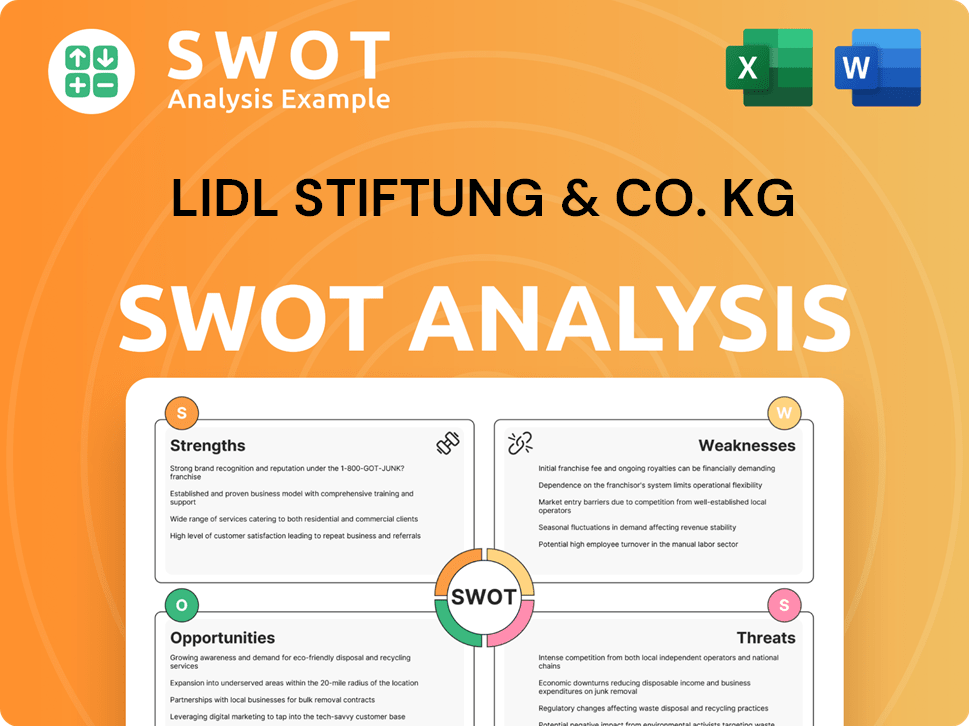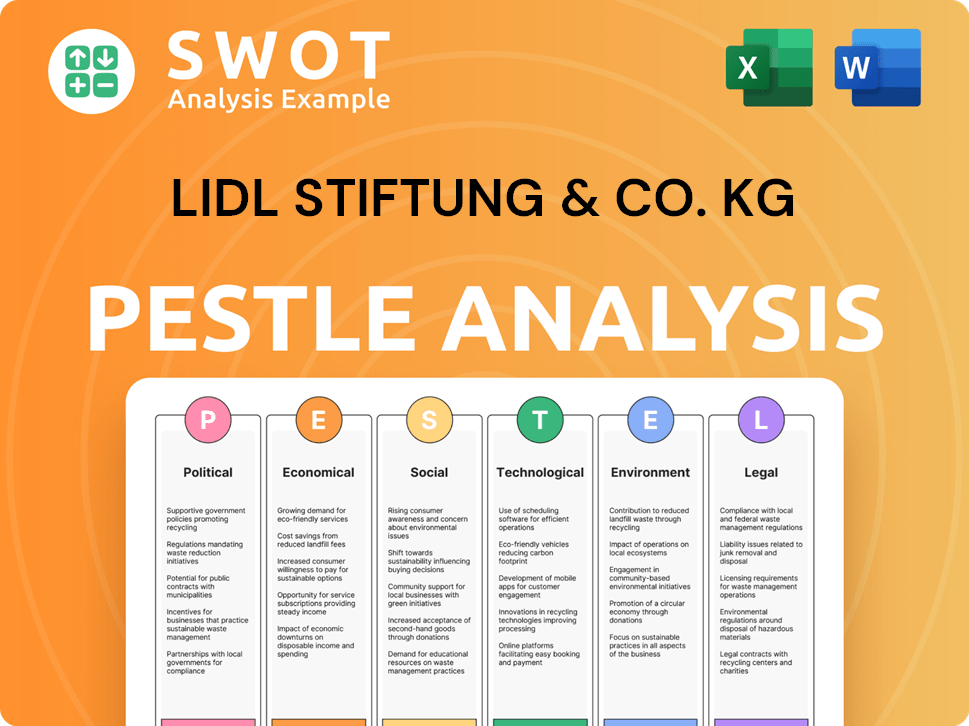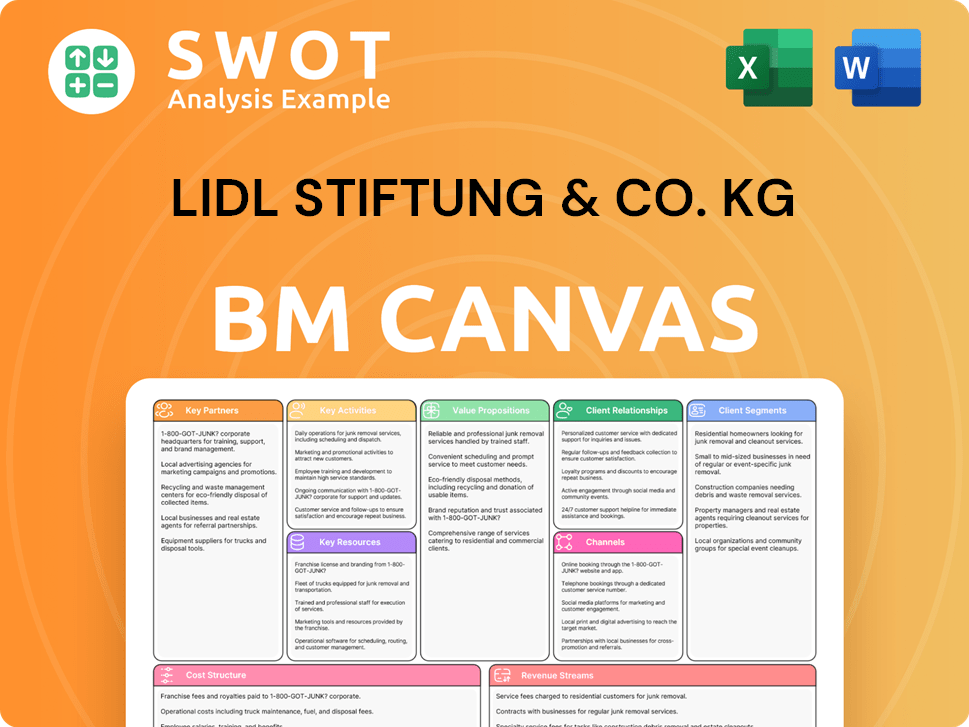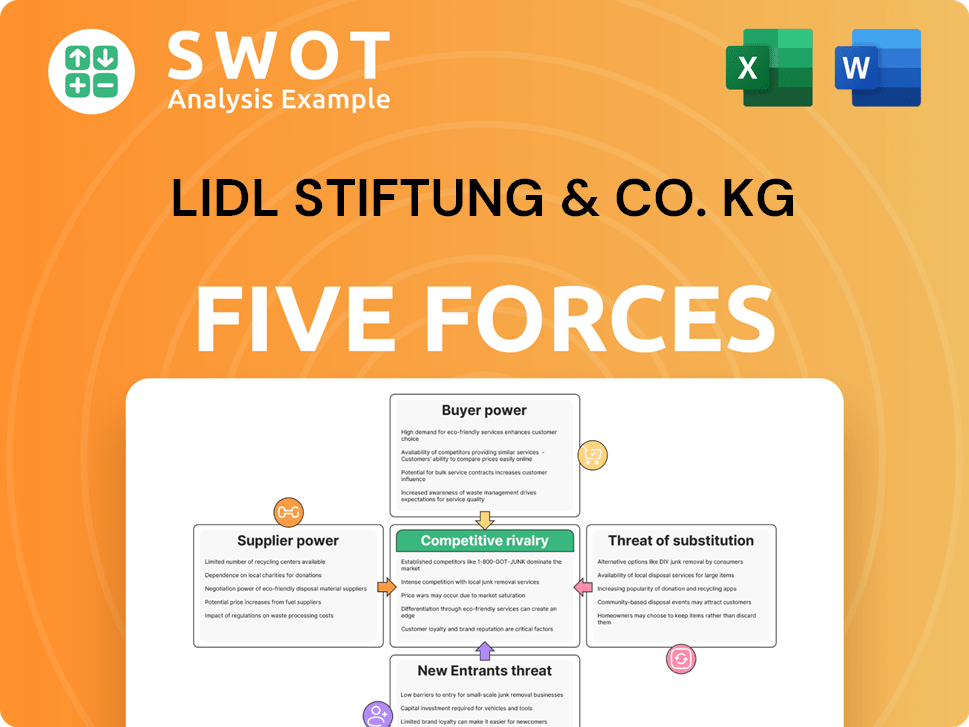Lidl Stiftung & Co. KG Bundle
Who Really Owns Lidl?
Unraveling the Lidl Stiftung & Co. KG SWOT Analysis is just the beginning; understanding its ownership is key to grasping its future. In the dynamic world of global retail, knowing "who owns Lidl" offers critical insights into its strategic decisions and market positioning. This exploration delves into the ownership structure of this retail giant, revealing the forces that shape its operations and global expansion.

From its humble beginnings in Germany to its current status as a global powerhouse, the evolution of Lidl's ownership has been a fascinating journey. The Lidl ownership structure, primarily controlled by the Schwarz Gruppe, significantly influences the company's strategic direction and financial performance. Understanding the nuances of the Lidl company and its parent company provides a clearer picture of its long-term vision and operational strategies, including its commitment to providing high-quality goods at competitive prices.
Who Founded Lidl Stiftung & Co. KG?
The story of Lidl Stiftung & Co. KG, and its ownership, begins with the Schwarz family. Josef Schwarz laid the groundwork in the 1930s, and his son, Dieter Schwarz, officially established Lidl & Schwarz KG in 1973, marking the formal founding of the modern discount supermarket chain.
From its inception, the ownership of Lidl was tightly held within the Schwarz family. This structure is typical of many German family-owned businesses, emphasizing long-term strategic control and independence. The focus was on building a sustainable business rather than seeking external investment or immediate profits.
While the exact initial equity distribution isn't publicly available, Dieter Schwarz was the primary owner, guiding the company's vision for a discount retail model. The early funding came from internal sources, reflecting the private, family-run nature of the enterprise. There is no publicly available information about any early external investors.
Dieter Schwarz founded Lidl & Schwarz KG in 1973.
Primarily held within the Schwarz family from the start.
Initial funding came from internal sources.
Family ownership allowed for swift decision-making.
Specific equity splits at inception aren't publicly disclosed.
No early external investors are publicly documented.
The concentrated family ownership of Lidl, particularly under Dieter Schwarz, facilitated a clear strategic direction focused on high-volume, low-cost operations. This structure allowed for quick decisions and a consistent approach to building the business. The Schwarz Gruppe, the parent company, continues to be a privately held entity, with Dieter Schwarz's descendants maintaining control. As of 2024, the Schwarz Group, which includes Lidl, is one of the largest retailers globally. In 2024, the Schwarz Group reported revenues of approximately €167.2 billion. The headquarters is located in Neckarsulm, Germany. The company's structure reflects a long-term strategy of reinvestment and growth, rather than being driven by the short-term pressures of public markets.
Understanding the early ownership of Lidl provides insight into its business model and long-term strategy.
- The company was founded by Dieter Schwarz in 1973.
- Ownership was primarily held within the Schwarz family.
- Early funding came from internal sources.
- The company's structure has enabled quick decision-making.
- The Schwarz Gruppe, which includes Lidl, remains a privately held entity.
Lidl Stiftung & Co. KG SWOT Analysis
- Complete SWOT Breakdown
- Fully Customizable
- Editable in Excel & Word
- Professional Formatting
- Investor-Ready Format

How Has Lidl Stiftung & Co. KG’s Ownership Changed Over Time?
The ownership of Lidl Stiftung & Co. KG is firmly rooted in the private sphere, primarily controlled by the Schwarz Group. This structure, with the Dieter Schwarz Foundation as the ultimate beneficial owner, has remained consistent, providing stability. This model has allowed for long-term strategic planning and expansion, such as the significant growth seen in the US market in recent years. Understanding the Growth Strategy of Lidl Stiftung & Co. KG is crucial to grasping the impact of this ownership model.
The Schwarz Group, which also owns Kaufland, is a privately held German retail group. The Dieter Schwarz Foundation, a charitable foundation established by Lidl's founder, Dieter Schwarz, ensures that a substantial portion of the company's profits supports charitable causes, mainly in education, science, and research. This setup shields the company from the short-term pressures often associated with public shareholdings. Unlike publicly traded companies, there are no IPO dates or market capitalizations to report.
| Key Aspect | Details | Impact |
|---|---|---|
| Ownership Structure | Privately held by the Schwarz Group, with the Dieter Schwarz Foundation as the ultimate beneficial owner. | Ensures long-term strategic focus and shields from short-term market pressures. |
| Key Stakeholders | Primarily the Schwarz family, through the Dieter Schwarz Foundation. | Maintains consistent leadership and vision. |
| Financial Strategy | Profits directed towards charitable causes and long-term investments. | Supports expansion and social responsibility. |
The key stakeholders remain the Schwarz family through the Dieter Schwarz Foundation. This structure has enabled Lidl to pursue aggressive expansion strategies and long-term investments without the constant scrutiny of quarterly earnings or activist investor campaigns. The company's growth, including its significant expansion into the US market in recent years, is a testament to the stability and long-term vision afforded by its private, foundation-backed ownership. In 2024, the Schwarz Group's revenue was approximately €167.2 billion, reflecting the success of its long-term strategies. Lidl's headquarters is located in Neckarsulm, Germany.
Lidl is owned by the Schwarz Group, a privately held German retail group, with the Dieter Schwarz Foundation as the ultimate beneficial owner. This structure ensures long-term strategic focus and supports charitable causes.
- The Schwarz Group also owns Kaufland.
- The Dieter Schwarz Foundation directs profits towards education, science, and research.
- The ownership model shields the company from short-term market pressures.
- Lidl's headquarters is in Neckarsulm, Germany.
Lidl Stiftung & Co. KG PESTLE Analysis
- Covers All 6 PESTLE Categories
- No Research Needed – Save Hours of Work
- Built by Experts, Trusted by Consultants
- Instant Download, Ready to Use
- 100% Editable, Fully Customizable

Who Sits on Lidl Stiftung & Co. KG’s Board?
Understanding the governance of Lidl Stiftung & Co. KG, it's crucial to recognize its structure as part of the privately-held Schwarz Group. Unlike publicly traded companies, Lidl doesn't have a conventional board of directors with independent members. Instead, the Schwarz family, primarily through the Dieter Schwarz Foundation, significantly influences the strategic direction and decision-making processes. This structure ensures that the ultimate control resides within the family and the foundation, shaping the company's long-term vision.
The leadership of the Schwarz Group effectively serves as the governing body for its subsidiaries, including Lidl. While specific names of individuals in a 'board of directors' capacity are not publicly disclosed, the family's influence is paramount. This private ownership model insulates the company from external pressures often faced by public entities, such as proxy battles or activist investor campaigns. This concentrated control allows for efficient strategic implementation and a focus on long-term goals, contributing to the stability and growth of the Lidl company.
| Aspect | Details | Relevance to Lidl |
|---|---|---|
| Ownership Structure | Private, controlled by the Schwarz family through the Dieter Schwarz Foundation. | Ensures long-term strategic focus and stability. |
| Governance | Integrated within the Schwarz Group's leadership; no traditional public board. | Streamlines decision-making and strategic alignment. |
| Public Disclosure | Limited public disclosure due to private ownership. | Shields the company from external market pressures. |
The ownership of Lidl, specifically Lidl Stiftung & Co. KG, is firmly rooted within the Schwarz Group, a privately held entity. This structure means that the decision-making power is concentrated, allowing for swift strategic implementation. This contrasts sharply with publicly listed companies, where governance is subject to shareholder influence. The private ownership model has allowed the company to expand its global presence. Learn more about the Target Market of Lidl Stiftung & Co. KG to understand its consumer base.
Lidl's ownership is private, ensuring long-term strategic focus.
- The Schwarz family, through the Dieter Schwarz Foundation, holds significant influence.
- This structure allows for streamlined decision-making and strategic alignment.
- Unlike public companies, Lidl is shielded from external market pressures.
- The private ownership model supports the company's global expansion.
Lidl Stiftung & Co. KG Business Model Canvas
- Complete 9-Block Business Model Canvas
- Effortlessly Communicate Your Business Strategy
- Investor-Ready BMC Format
- 100% Editable and Customizable
- Clear and Structured Layout

What Recent Changes Have Shaped Lidl Stiftung & Co. KG’s Ownership Landscape?
Over the past few years, the ownership of Lidl Stiftung & Co. KG, has remained consistent. The company is primarily owned by the Dieter Schwarz Foundation, maintaining its private structure. This structure allows for long-term strategic planning, focusing on expansion and operational efficiency. By early 2024, the company operated over 170 stores in the US, showcasing its ability to invest heavily in growth.
The private ownership model of Lidl, backed by the Schwarz Group, shields it from the pressures of public markets. This enables a focus on market penetration and strategic initiatives. The stability of the ownership structure has allowed Lidl to navigate the competitive retail environment effectively. The company's continued investment in its global presence, including its US expansion, is a key indicator of its strategic direction.
The ownership structure of Lidl Stiftung & Co. KG has remained consistent, primarily under the Dieter Schwarz Foundation. This private structure supports long-term strategic goals. The stability allows the company to focus on market penetration and operational efficiency.
Lidl's expansion, particularly in the United States, reflects its growth strategy. By early 2024, Lidl operated over 170 stores in the US. This expansion is supported by the company's ability to invest heavily in growth.
Lidl Stiftung & Co. KG Porter's Five Forces Analysis
- Covers All 5 Competitive Forces in Detail
- Structured for Consultants, Students, and Founders
- 100% Editable in Microsoft Word & Excel
- Instant Digital Download – Use Immediately
- Compatible with Mac & PC – Fully Unlocked

Related Blogs
- What are Mission Vision & Core Values of Lidl Stiftung & Co. KG Company?
- What is Competitive Landscape of Lidl Stiftung & Co. KG Company?
- What is Growth Strategy and Future Prospects of Lidl Stiftung & Co. KG Company?
- How Does Lidl Stiftung & Co. KG Company Work?
- What is Sales and Marketing Strategy of Lidl Stiftung & Co. KG Company?
- What is Brief History of Lidl Stiftung & Co. KG Company?
- What is Customer Demographics and Target Market of Lidl Stiftung & Co. KG Company?
Disclaimer
All information, articles, and product details provided on this website are for general informational and educational purposes only. We do not claim any ownership over, nor do we intend to infringe upon, any trademarks, copyrights, logos, brand names, or other intellectual property mentioned or depicted on this site. Such intellectual property remains the property of its respective owners, and any references here are made solely for identification or informational purposes, without implying any affiliation, endorsement, or partnership.
We make no representations or warranties, express or implied, regarding the accuracy, completeness, or suitability of any content or products presented. Nothing on this website should be construed as legal, tax, investment, financial, medical, or other professional advice. In addition, no part of this site—including articles or product references—constitutes a solicitation, recommendation, endorsement, advertisement, or offer to buy or sell any securities, franchises, or other financial instruments, particularly in jurisdictions where such activity would be unlawful.
All content is of a general nature and may not address the specific circumstances of any individual or entity. It is not a substitute for professional advice or services. Any actions you take based on the information provided here are strictly at your own risk. You accept full responsibility for any decisions or outcomes arising from your use of this website and agree to release us from any liability in connection with your use of, or reliance upon, the content or products found herein.